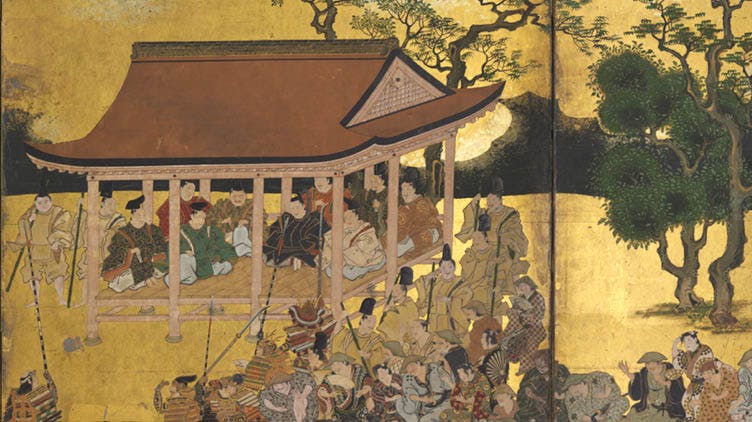
Shinto: Discovery of the Divine in Japanese Art
- Special Exhibition
The Kelvin and Eleanor Smith Foundation Exhibition Hall

Horse Race at the Kamo Shrine (detail), c. 1634–44. One of a pair of six-panel folding screens, ink and color on gilded paper; image: 176.5 x 337.3 cm. The Cleveland Museum of Art, Purchase from the J. H. Wade Fund, 1976.95.1
About The Exhibition
Shinto: Discovery of the Divine in Japanese Art is presented in two rotations. The first rotation runs from Tuesday, April 9 to Sunday, May 19. The second rotation runs from Thursday, May 23, through Sunday, June 30. The exhibition will be closed on Tuesday, May 21, and Wednesday, May 22, to rotate the works of art. The exhibition reopens on Thursday, May 23.
The veneration of deities called kami has been a central feature of Japanese culture for many centuries and the inspiration for a wide range of Japanese visual art. Most recently, kami veneration falls under the auspices of a diverse body of rites known as Shinto, or the “Way of the Gods.” The first exploration devoted to Shinto art from collections in both the United States and Japan, this exhibition introduces works exemplifying kami worship from the Heian period (794–1185) through the Edo period (1615–1868).
The exhibition and its accompanying catalogue take a thematic approach to understanding the artworks created to celebrate the world of kami. From costumes worn in dances and theatrical performances at shrines to paintings of medieval pilgrimage routes and images of kami and Buddhist deities, the exhibition is an expression of the everyday engagement of people with divinities in their midst. Including about 125 works of art in two rotations, it features treasures from Japanese shrines and temples, and a significant number of works designated as Important Cultural Properties by the Japanese government.
Because of the sensitivity of the objects in this exhibition, a significant number of artworks will be replaced midway through the exhibition. Many of the works in this exhibition are made of organic materials such as silk, paper, wood, and lacquer that are sensitive to light and have structural fragility. To balance our frequency of access to them with their long-term preservation, they can only be on view for a limited time. For this reason, works designated as Important Cultural Properties by the Japanese government have specific requirements that limit public display for only a few weeks in any given year to ensure preservation of the artwork.
We invite and encourage visitors to return to the exhibition to see both rotations. Nonmember tickets purchased during the first rotation (April 9–May 19) can be redeemed to view the second rotation for free beginning May 23, 2019. (See ticketing information below)
Image credits: Photo: Nara National Museum, Photo: Kenji Yamazaki, Photo: TNM Archives, Photo: Osaka City Museum of Fine Arts, Photo: Kasugataisha shrine
Many of these works come from Japanese shrines and are actively worshipped objects; therefore, out of respect, the lenders ask that there be no photography allowed in this exhibition.
Featured Art
Sponsors
Shinto: Discovery of the Divine in Japanese Art is organized by the Cleveland Museum of Art with the special cooperation of the Nara National Museum.
The Cleveland Museum of Art gratefully acknowledges:
PRESENTING SPONSORS
Image

| Image

|
|
SUPPORTING SPONSORS
Image

| Image

|
This exhibition was organized by the Cleveland Museum of Art, with the special support of the Japan Foundation as part of Japan 2019, a series of events highlighting Japanese arts and culture in the United States throughout 2019.
Image

| Image

|
Kenneth S. and Deborah G. Cohen | The John D. Proctor Foundation |
Thomas & Beatrice Taplin Fund |
ADDITIONAL SUPPORT | ||||||||
Blakemore Foundation | Andrew W. Mellon Foundation Endowment Fund | |||||||
Iwashimizu Hachimangū Shrine | Samukawa Jinjya Shrine | Miyajidake Jinjya Shrine | ||||||